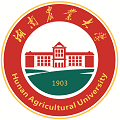Study in Hunan Agricultural University About Hunan Agricultural University & Study in hunau
About Hunan Agricultural University
Hunan Agricultural University (HUNAU), a key provincial university under the co-construction of Ministry of Agriculture of the People’s Republic of China and the People’s Government of Hunan Province, has been selected as one of the first national experimental units in the Research Institute of New Rural Development by the Ministry of Education and the Ministry of Science and Technology. It has also been selected for “the Project for Basic Capacity-building of Midwest Universities”. In 2012, HUNAU was granted a first-level university status, so it is now qualified to recruit first-class undergraduate students. With a campus measuring 2.27 square kilometers and situated in Furong District of Changsha, the university looks out onto the beautiful scenery of Donghu Lake to its north and Liuyang River to its south. Because of this, the HUNAU campus is a tranquil setting, where students can enjoy the clean and peaceful surroundings. It has been awarded the titles of “Outstanding Unit” in a national teaching evaluation carried out by the Ministry of Education, “National Civilized Unit” and “Garden Unit” by the Chinese Government. HUNAU developed from Hunan Provincial Xiuye Agricultural and Forestry College which was formed in 1903, it was renamed Hunan Agricultural College in 1951. Chairman Mao Zedong inscribed the name of the university in person in November of that same year. It was renamed Hunan Agricultural University in February of 1994 with the approval of the former State Education Commission.
After more than 110 years of development, HUNAU has established itself as a comprehensive agricultural university, entitled to award degrees in the fields of agriculture, engineering, liberal arts, sciences, economics, management, law, pedagogy, medicine and the arts. Currently, the university has 21 colleges, awarding bachelor's degrees in 72specialties. It also awards master's degrees in 18 first-level specialties and doctorates in 8 first-level specialties. Furthermore, it has 10 post-doctoral research stations, and 17 national and provincial key subjects. There are numerous labs, research centers and bases in HUNAU. Some of them are national level, including 1 key lab, 3 engineering labs, 1 engineering technology research center, 1 breed improvement sub-center, 9technological research and development sub-center and scientific and technological achievements transformation center, 1 central south agricultural experimental station for China tobacco, and 1 key base of vocational education training for teachers. Some of them are supported by the Ministry of Education, including 2 key labs and 1 engineering research center. Some of them are supported by the Ministry of Agriculture, including 2 key labs, 1 Central China observation and experimental station for crop cultivation, and 1 modern agricultural technology training base. Some are the first group of bases constructed by both the Ministry of Education and the Ministry of Agriculture, which are the 4 training bases for agricultural scientific and teaching talents. The others are provincial level, including 16 key labs (research centers) and 9 research bases.
At present, HUNAU has an academic staff of 1189, including 5 academicians of the Chinese Academy of Engineering, 854 professors and associate professors, 279 doctoral advisors and 758master's advisors. The university is home to more than 30,000 students from 31 provinces, municipalities and autonomous regions throughout China. The student body includes more than 26,009 undergraduates, more than 4,325 master’s and doctoral degree candidates. Currently, HUNAU has a building footprint totaling 1,010,000 square meters. The main on-campus library contains in excess of 1.9 million books. The teaching and experimental instrumentation is valued at over 330 million Yuan.
In recent years, HUNAU has improved significantly in the areas of specialty construction, teaching quality, educational reform, scientific research, affiliated enterprises, teaching and learning conditions, campus facilities and talent training. During the past sixty years, more than 200,000 elite students have graduated from HUNAU. The university has carried out an open policy when running schools and has established the university board of directors. International exchanges and cooperation has been enhanced, and close relations now exist between HUNAU and more than 20 foreign universities in 10 countries, including Greenwich University and University of Essex in the UK, Ohio State University in the USA, the University of Montreal in Canada, Kagoshima University, the University of Shiga Prefecture and Meio University in Japan, Rajamangala University of Technology in Thailand, Wroclaw University of Environmental and Life Sciences in Poland, and the University of South Australia, Flinders University and James Cook University in Australia. In 1998 HUNAU was authorized to enroll international students, and in 2002 the university began to send undergraduates to foreign universities on international exchange programs.
The goals for the future of HUNAU are: to establish a wider range of subjects, enhance the quality of undergraduate and postgraduate education, and attach equal importance to teaching, studying, scientific research and affiliated enterprises, with the aim of making itself a high-level teaching-research university among the leading ranks of the similar colleges and universities in China.

